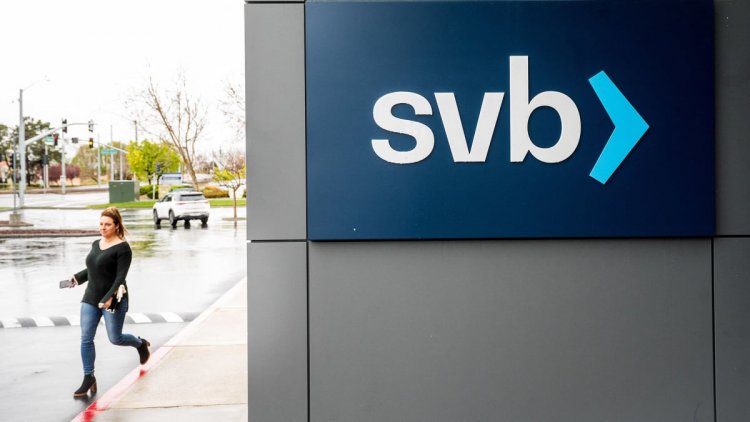SVB Collapse: the CEO and Other Top Executives Hit by First Lawsuit
A Silicon Valley Bank investor has filed a lawsuit against top executives for their role in the bank's sudden collapse. This lawsuit may not be the last.

A Silicon Valley Bank investor has filed a lawsuit against top executives for their role in the bank's sudden collapse. This lawsuit may not be the last.
It's the first but it's probably not the last.
A lawsuit was filed on Mar. 13 against top executives of Silicon Valley Bank, notably its CEO Greg Becker and Daniel Beck, the Chief Financial Officer, for allegedly "disseminating false and misleading statements and information" regarding the balance sheet of the failed bank.
The lawsuit is also directed against every manager who "was directly involved in the day-to-day operations of the company at the highest levels; was privy to confidential proprietary information concerning the company and its business and operations," according to the 17-page lawsuit reviewed by TheStreet.
The plaintiff is also attacking the bank itself.
Suit Claims 'Misleading Statements'
The plaintiff, Chandra Vanipenta, accused the executives of SVB (SIVB) - Get Free Report of having failed to mention the risks that interest rates increase by the Federal Reserve (Fed) will have on its portfolio of securities. The bank was closed on Mar. 10 by regulators after depositors rushed to withdraw their funds, forcing it to sell Treasury bonds at reduced valuations.
Vanipenta claims that the bank should have mentioned these risks in all its financial statements relating to results from the second quarter of 2021 since Jay Powell, the Chair of the Fed, had signaled, in a speech given on June 16, 2021, an upcoming change in monetary policy.
"The 2Q21 Report did not disclose the risk that future interest rate hikes posed to the company’s business, despite the Fed signaling that it might raise interest rates in the future, and was certainly prepared to do so in the event of rising inflation," the plaintiff alleged in their lawsuit. "The 2Q21 report stated, in pertinent part, '[t]here are no material changes to the risk factors set forth in our 2020 annual report on form 10-K."
The company repeated, the plaintiff alleged, the same sentences in the various publications of results and regulatory filings that followed until March 8, 2023.
"Defendants made false and/or misleading statements and/or failed to disclose that: the company failed to disclose to investors the risks presented by impending rising interest rates," the lawsuit said. "The company failed to disclose to investors that, in an environment with high interest rates, it would be worse off than banks that did not cater to tech startups and venture capital-backed companies."
It continued: "The company failed to disclose that, if its investments were negatively affected by rising interest rates, it was particularly susceptible to a bank run; as a result, defendants’ public statements were materially false and/or misleading at all relevant times."
SVB didn't immediately respond to a request for comment.
Class Action Certification Sought
Created in 1983, Silicon Valley Bank, which presented itself as a "partner for the innovation economy,” offered higher interest rates on deposits than its larger rivals, to attract customers. The company then invested the clients' money in long-dated Treasury bonds and mortgage bonds with strong returns.
This strategy had worked well in recent years. The bank’s deposits doubled to $102 billion at the end of 2020 from $49 billion in 2018. In 2021, deposits increased to $189.2 billion.
But everything turned upside down when the Fed began to raise interest rates, which made existing bonds held by SVB less valuable. As a result, the bank had to sell the bonds at a discount to cover withdrawals from its customers. In selling these bond positions, SVB had to take a significant loss of $1.8 billion.
Due to this loss, SVB suddenly announced that it needed to raise additional capital of $2.25 billion, by issuing new common and convertible preferred shares. This decision caused panic and a run on the bank.
About $42 billion of deposits were withdrawn by the end of March 9, according to a regulatory filing. By the close of business that day, SVB had a negative cash balance of $958 million, according to the filing.
"During the class period, the company and the individual defendants, individually and in concert, directly or indirectly, disseminated or approved the false statements specified above, which they knew or deliberately disregarded were misleading in that they contained misrepresentations and failed to disclose material facts necessary in order to make the statements made," the plaintiff alleged.
According to the lawsuit, the "misrepresentations" and "omissions" alleged would tend to "induce a reasonable investor to misjudge the value of the company’s securities."
As a result, the plaintiff hopes that their lawsuit will be transformed into a class action and that there will be a trial.
They are seeking damages and payment of their attorneys' fees.
The lawsuit was filed with the United States District Court of Northern District of California by the Rosen Law Firm that is the counsel of the plaintiff.
What's Your Reaction?



























































